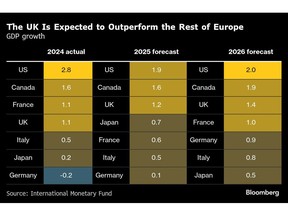
Article content
(Bloomberg) — Britain will grow faster than any other major European economy this year and next but continue to lag behind the US and Canada among Group of Seven industrialized nations, according to the International Monetary Fund.
THIS CONTENT IS RESERVED FOR SUBSCRIBERS ONLY
Subscribe now to read the latest news in your city and across Canada.
- Exclusive articles from Barbara Shecter, Joe O'Connor, Gabriel Friedman, and others.
- Daily content from Financial Times, the world's leading global business publication.
- Unlimited online access to read articles from Financial Post, National Post and 15 news sites across Canada with one account.
- National Post ePaper, an electronic replica of the print edition to view on any device, share and comment on.
- Daily puzzles, including the New York Times Crossword.
SUBSCRIBE TO UNLOCK MORE ARTICLES
Subscribe now to read the latest news in your city and across Canada.
- Exclusive articles from Barbara Shecter, Joe O'Connor, Gabriel Friedman and others.
- Daily content from Financial Times, the world's leading global business publication.
- Unlimited online access to read articles from Financial Post, National Post and 15 news sites across Canada with one account.
- National Post ePaper, an electronic replica of the print edition to view on any device, share and comment on.
- Daily puzzles, including the New York Times Crossword.
REGISTER / SIGN IN TO UNLOCK MORE ARTICLES
Create an account or sign in to continue with your reading experience.
- Access articles from across Canada with one account.
- Share your thoughts and join the conversation in the comments.
- Enjoy additional articles per month.
- Get email updates from your favourite authors.
THIS ARTICLE IS FREE TO READ REGISTER TO UNLOCK.
Create an account or sign in to continue with your reading experience.
- Access articles from across Canada with one account
- Share your thoughts and join the conversation in the comments
- Enjoy additional articles per month
- Get email updates from your favourite authors
Sign In or Create an Account
or
Article content
In an update to its World Economic Outlook, the Washington-based economic supervisor raised its global growth forecasts to reflect both the improved trade backdrop and the fiscal stimulus from President Donald Trump’s One Big Beautiful Bill Act.
Article content
Article content
Article content
The UK, the European Union, China and Japan have struck trade deals with the US to avoid the most punitive tariff rates Trump was threatening. The IMF said the US effective tariff rate used in its latest projections was 17.3%, down from 24.4% in its April WEO forecast, and the rate for the rest of the world was 3.5% compared with 4.1%.
Article content
By signing up you consent to receive the above newsletter from Postmedia Network Inc.
Article content
Its UK outlook was unchanged from May when the IMF announced a modest upgrade in its Article IV health check on the economy. Britain is expected to grow 1.2% this year, faster than the 1.1% forecast in April, to reflect improved trading terms with the US after striking an early deal, and 1.4% in 2026.
Article content
Of the European G-7 members, Germany and Italy were also upgraded by 0.1 percentage point in 2025 but growth will be sub-1% for both countries this year and next. France grows 0.6% and 1%, respectively, in the IMF projection.
Article content
The fund drew attention to the spike in UK government bond yields and noted that markets expect the Bank of England to cut interest rates twice more to 3.75% this year but issued no further comment.
Article content
Countries that have not raised tariffs but are exposed to the global impact of Washington’s levies will “face a demand shock.” The UK fits that definition. “Central banks could, in this case, gradually reduce the policy rate,” the IMF said.
Article content
Advertisement 1

.jpg) 13 hours ago
1
13 hours ago
1
 English (US)
English (US)